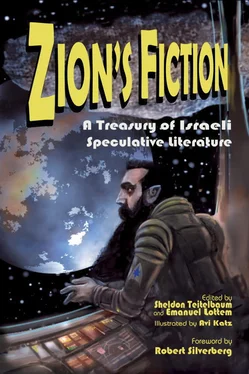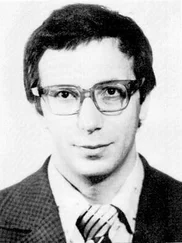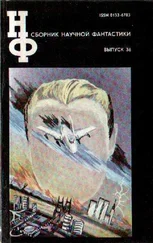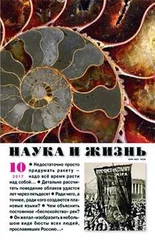When it was over, she found herself lying prone on the bed in darkness. The candles had gone out. She turned on the light. The bed was littered with a pitifully small handful of bone fragments. She was ravenously hungry. She took a shower and spent the rest of the night eating canned tuna and watching movies in Arabic.
At dawn she went out into the clarity of Jerusalem. So early in the day, the city looked empty and innocent, its buildings dissolving into pink shadows on the craggy hills. Mor drove to the mall in Talpiot and stood by the parapet, looking down at the glorious panorama of the Mount of Olives with the golden dome of the great mosque and the dark lines of trees crossing the valley of Gehenna.
She heard steps behind and turned. Daniel, looking fresh and dapper in a white shirt and jeans, smiled at her.
“Well done,” he said.
She stared at him, incredulous.
Over the left nipple, his shirt was stained by fresh blood.
“Thank you, Hanna. You have given me a new lease.”
“You?” she gasped."Coming back?”
“No, no. My old job is done. I have simply taken your late husband’s vacant place. Nature—or whoever our manager is—abhors vacuum. I am too young to retire. I knew that when there was a job opening I would be the first on the list. I’m sure I’ll significantly improve on David’s performance.”
“I should have known,” she said dully.
“Don’t blame yourself. You did not imagine this morning would see all the guns beaten into ploughshares, did you?”
The city was waking up. A car honked, a child cried, a long call drifted up from the mosque in the valley.
“Just tell me one thing,” she said. “What was your real name?”
He shook his head.
“I don’t remember. Perhaps I did until last night, but now, with my new position I remember some things. Piano playing, a woman with dark hair—my mother? Light on linden leaves in spring. But it’s fading, memory disappearing. Like that, see?”
He rolled up his shirtsleeve. On the white skin Mor could see disjointed blue strokes—the remnants of a tattoo—that were being absorbed into the body even as she watched.
“We all have our badges,” he said. “I shan’t be sorry to let this one go.”
Mor looked into his eyes and smiled.
“You have miscalculated, Daniel,” she said. “Or whoever you are. Killing is a spur to breeding. You should have been more careful about murdering your own. And now what will you do, you and your fellow maggots, when death becomes fruitful and multiplies? What will you feed on when life starts feeding on you?”
He stared at her uncomprehendingly.
“I am pregnant,” she said.
“You can’t be! You’re still….”
“Death’s wife. I know. But my husband died in my arms, and I am carrying his seed. I am not a pawn in your game, you smug bastard! I am the mother of the future King who will ride down this very mountain and call up the dead from their graves. He will mold ashes back into bodies and clothe burnt bones with flesh. And he will judge you as you deserve to be judged. My son is King of the living and the dead, and he will make each death beg for oblivion before he slays you all. And you, you will remember your name when you are called to his judgment!”
Daniel’s right hand crept up, the fingers melting together, acquiring a metallic sheen, fusing into a small but deadly looking gun.
Mor laughed. “I thought immunity from the family was part of the bargain! Fool that I was, to trust a death! But I have better protection. Go ahead, shoot me! Do it! Why can’t you? Could it be you are sensing your King? Could it be my baby is already stronger than you?”
Daniel dropped his hand, which resumed its normal appearance. There was fear in his eyes but also something else, something that looked like relief.
“Well,” he said, “this was not planned. But this was bound to happen, sooner or later. And of course, this is the most appropriate place for it. The only place. I wonder what went through David’s dull brain when he decided to take his Middle Eastern vacation. But even if he had a… guidance, this is irrelevant now. You are right, Mor. I cannot touch you. And I can feel the thing in your womb even though it is tinier than a mustard seed. But I wonder what it’ll be like when it’s fully grown. It’s conventional to wish a prospective mother joy, but frankly, I wonder whether you’ll have much joy in your baby. Think of your predecessors: they did not fare well with their kingly sons, who had broken their hearts before future generations bestowed upon the poor women heaps of silly titles. But in any case, Your Future Majesty, though I may be bound to obey your son, I am not going to welcome him with myrrh and frankincense. And though I may be the first one to be hauled before his judgment seat, I will maintain my innocence to the end. I only followed orders.”
He turned and walked away, his back ramrod-straight.
Every Friday Mor goes to the Wailing Wall, slowly wending her way through the narrow, twisting lanes of the market, bright with tourist junk and fragrant with spices, coffee, and sweat. Some shop owners recognize her and offer her bright blue beads against the evil eye, which she willingly buys. At the familiar corner stall she rests her heavy belly, sitting on a scratched aluminum chair and sipping cardamom-flavored coffee from a tiny cup. She hears shots and glimpses a steely blue apparition disappear among the fluttering rugs. She is unmoved, and so is Ali, who continues his rapid monologue in garbled English and shakes his head when she offers to pay for the coffee.
The square in front of the Wailing Wall is beaten into monochrome whiteness by the glare of the noon. A couple of soldiers lazing about in their glass booth throw her an indifferent glance. The women’s section of the wall is less crowded than usual; only some Orthodox heads hidden under untidy wigs are pressed to the eroded stones like a row of bushy little animals. Their men rock on the other side of the partition, their black coats soaking up heat. Mor picks up a modesty shawl from the stand to cover up her bare shoulders, walks to the wall, kisses the warm, powdery rock.
“Soon,” she tells the unmoving weight in her womb. “Soon, honey.”
At home she lights the Sabbath candles, fixes dinner, and sits in front of the TV, absorbing the latest litany of nuclear threats, military casualties, and political crises.
A breaking news banner appears at the bottom of the screen when Mor feels a sickening pang in her lower abdomen. She sits up, breathless, the dinner tray pushed aside. Yes, no doubt of it, the beginning of labor, just as she had been taught in those long-ago birth preparation classes. A wave of exultation sweeps over her, overcoming another brutal spasm that feels as if somebody has grabbed a handful of her entrails and twisted them. The hem of her dress is soaked: her water has broken.
Mor reaches for her phone to call an ambulance. A hand closes on hers.
“No need,” says a familiar voice.
Deftly, Maggie rearranges the cushions on the couch to prop up her back. Dazed, Mor looks around. Familiar faces look back at her. Ruth smiles shyly; Victoria pulls clean sheets out of a large tote bag; Zoe plugs in the kettle in the kitchen. Liliana shoos out the men who crowd at the door. George waves at her; somebody else—Mikhail?—flashes a V sign.
Mor pushes Maggie aside and tries to stand up. But she can’t: the pain is too strong.
“Why?” she cries. “What are you doing here?”
“We want to help you,” says Ruth.
“We want to be here when the King is born,” says Victoria.
She looks at them mutely, and they look back: War, Famine, Plague, Old Age, and Voodoo.
“Do you acknowledge my son, then?” asks Mor.
Читать дальше






